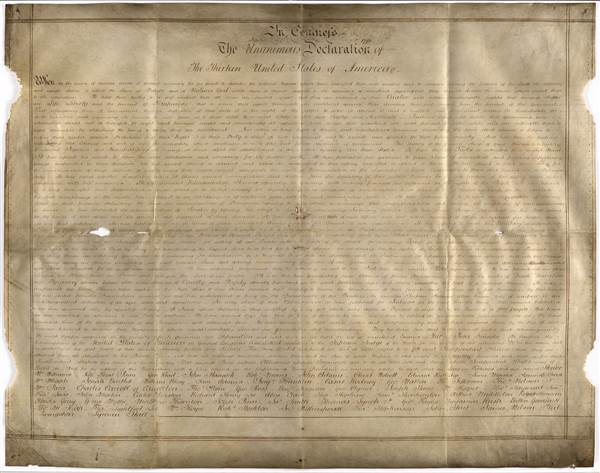World News – Two Harvard researchers have uncovered a more than 200-year-old parchment copy of the Declaration of Independence — sitting in a record office in Britain.
 Researchers Emily Sneff and Danielle Allen, who have dated the document to the 1780s, said that it was discovered inside the West Sussex Record Office, in Chichester, England.
Researchers Emily Sneff and Danielle Allen, who have dated the document to the 1780s, said that it was discovered inside the West Sussex Record Office, in Chichester, England.
The original 1776 copy has been housed in the National Archives in Washington, D.C., alongside the Constitution and Bill of Rights, since 1952.
Sneff and Allen have been compiling a database, called the Declaration Resource Project, to gather every copy of the Declaration of Independence from 1776 to 1820, including broadsides, newspaper versions and books. Almost immediately, the two knew the parchment differed from the 300 copies currently in the directory, as it was the same size and scale as the ceremonial 1776 manuscript.
“We quickly realized it was unlike any other copy that was in our database. It was very exciting,” Sneff told NBC News on Sunday. “I was skeptical at first… [but] this is the kind of discovery that every historian wants to make.”
Likely produced in Philadelphia or New York, the researchers believe the manuscript was originally held by Third Duke of Richmond Charles Lennox. The 18th century British politician is known for his support for America during the Revolution.
But it’s still a mystery as to who sanctioned the Sussex Declaration.
Sneff and Allen, along with a team of analysts, are working to identify the commissioner and say signs point to James Wilson, a signer of the Declaration representing Pennsylvania and Supreme Court Justice from 1789 to 1798.
In a research paper presented on Friday, the researchers supported their theory, writing: “Wilson did more than any other founder to activate the Declaration of Independence as foundational to the ideological origins of the new nation.”
One detail in the Sussex version stands in stark contrast to other versions. Rather than grouping the signatories by state, the Sussex version lists names individually. Allen said this showcases the belief of Federalists, such as Alexander Hamilton, that authority rests nationally on the people and not on a federation of states.
“This difference goes along with a debate that was raging on in the 1780s between Federalists and anti-Federalists,” Allen said. “That’s one thing that makes the discovery so significant.”
by AVALON ZOPPO, NBCNews.com
